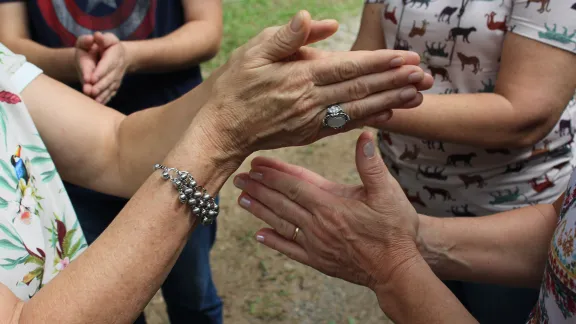
Facilitating intergenerational dialogue is part of the young reformersâ activities in the Evangelical Church of the Lutheran Confession in Brazil. Photo: IECLB / Martina Scherer
LWF LAC and North America youth reflect on their role in strengthening the church
(LWI) – Elías Pérez sees his specific role as a young reformer from the Mexican Lutheran Church (ILM) as someone who can “build with one hand in my country and take the hands of my sisters and brothers from around the world with my other hand, and, when my time is done, let others take their turn.”
He was among more than 30 members of The Lutheran World Federation (LWF) Global Young Reformers Network 2.0 in the Latin American and Caribbean and North American regions who recently met online to discuss the connection between their respective roles in the church and global LWF priorities. Three global youth priorities decided at the 2017 Assembly guide the activities of young reformers: revival of churches, equity and education; and two crosscutting themes -- climate justice and youth participation.
For Pérez, this role as a young reformer became especially evident when the coronavirus disease (COVID-19) pandemic began last March. Uncertainty set in not only about plans for the ILM national youth gathering, “but from one Sunday to the next, we stopped having gatherings and the big question was: ‘what next’”?
He continues: “Out of our own initiative we [youth] met online for the first time and decided we wanted to do something. The idea was to record worship services each Sunday especially for congregations that would not be able to have one. The church president (Rev. Roberto Federico Trejo Haager) was very happy that we, as youth, wanted to help.” In about two days, everything had been set up, with support from all over the country for video editing, putting together music, and assisting the church president to deliver his sermon.
Pérez believes the youth response during a crisis has contributed to strengthening connections in the church. He noted that people who could not always attend church, especially the elderly, and those who used to be reluctant about using new technology, are now among the many people following the online services “in multiple accents accompanied by multiple ways of playing music.”
The ILM young reformer is aware that the role of young people in the church is not only about involvement in regular youth activities and providing support in crises such as the COVID-19 pandemic. He is eager to learn how others in the global LWF network are engaged in issues such as climate change and gender justice. Mexico, he adds, “is a place of suffering for migrants coming from other parts of the LAC region; my role is to embrace their struggles, offer an ear to listen, and help them with clothes, food, not to be prejudiced.”
Stronger bonds
Alejandra Victoria Lopez Ortega from the Nicaraguan Lutheran Church of Faith and Hope said her role as a young global reformer “is about encouraging other young people and creating bonds that help to strengthen the faith, as we follow the message of the gospel to be the salt and light to the world.”

In Nicaragua, the church supports people facing social and economic hardship especially women during the COVID-19 pandemic. Photo: Alejandra Lopez
Lopez is engaged in church activities that support people facing social and economic hardship especially women, which became especially important during the COVID-19 pandemic, as these groups found it more difficult to access basic needs including protective measures. She hopes the global LWF network would be a space to generate ideas about how youth formation can strengthen the church in its mission and contribute to generational renewal.
Intergenerational dialogue
“Being a global young reformer is about facilitating unity in a network of young people, who are connected through a Lutheran identity expressed in different backgrounds and different places across the world,” says Renato Valenga from the Evangelical Church of the Lutheran Confession in Brazil (IECLB). He is a member of the church’s national youth council, CONAJE, which leads several activities including the Youth and Elderly People and the Youth and Environmental Justice campaigns.
Being a young reformer is about encouraging other young people, and creating bonds that help to strengthen the faith, as we follow the message of the gospel to be the salt and light to the world.
Engaging youth and seniors to discuss empathy and the importance of taking care of one another with dignity “brought us good outcomes and made different generations reflect on unity, respect, patience, and love” he explains. “This goes toward “strengthening intergenerational dialogue in the community.”
In the environmental justice campaign, the goal is to ensure that protecting the environment remains a priority for the current generations and for the entire church. “It is not a responsibility for the youth alone, but rather a journey for every generation, because creation is never for sale.”
Reformation is a continuous process, Valenga adds. “We therefore need continuous leadership formation and mutual support to promote initiatives at the different levels of life in communion.” He sees the engagement of young people as equally critical in issues on racial justice and equity.
Reflecting on discussions at the online meeting, LWF Program Executive for Capacity Building and Leadership Development Rev. Katariina Kiilunen, said that “young leaders want youth priorities to be integrated into the LWF priorities. It is time to work with young people and their leadership should not be limited to only other young people.”
By LWF/P. Mumia


